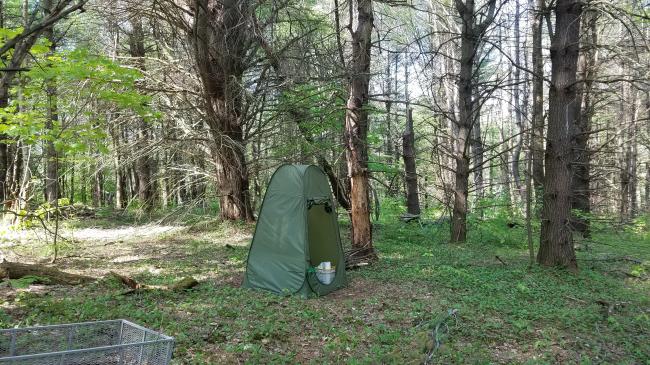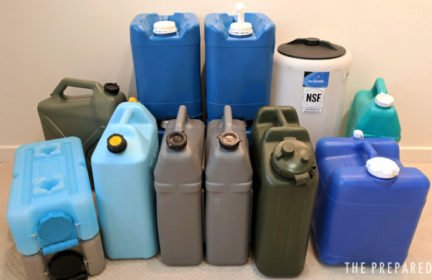Toilet when there’s no water?
Here’s something I’ve been wondering about for a while when thinking about prepping. What happens in a scenario where we lose water at home as far as toileting needs are concerned?
-
Comments (20)
-
TraceContributor - June 13, 2020
That’s why we encourage everyone to store so much water! Of course if we lose water, toilet use drops as a priority. But assuming you’ve stored plenty of water to drink, cook, and wash with, you can use any available non-potable water to flush your toilet.
Ensure the toilet tank is full, do your business, flush, then refill the back of the tank from a bucket of available water. This can work for as long as the sewer, or septic system, continues to function. FYI older toilet tanks typically hold 3 – 5 gallons, and the newer ones are less than 2 gallons — so this is a big water drain (pun intended), plan accordingly. A pond or a swimming pool (or hot tub) are good sources of water to flush. Remember to be aware of any pool chemicals in the water before you flush it into a septic system.
We’ve also considered a compostable toilet, for out in our barn where we don’t have a septic drain. That’ll require more research, and would make for an interesting article from The Prepared.
Does anyone have a compostable toilet that can pass on advice?
-
John AdamaStaff - June 14, 2020
We’ll definitely publish a formal guide on austere toilet gear/tips. Anyone is welcome to start putting the basics together, and we’ll put it up.
-
Matt Black - September 28, 2020
FWIW, I just remembered that this exists:
Viscoelastic solid-repellent coatings for extreme water saving and global sanitation
The product is called LESS. Unfortunately, the coating has to be regularly re-applied. The researcher(s) are looking for a more permanent solution.
Also unfortunate, the article is behind a paywall. The link is provided for anyone who has access or is interested in buying access. (Apparently, proprietary information doesn’t want to be free. 🧐😒)
Silver lining: Here’s the podcast episode where they interview its inventor and explain how it works.
NPR ShortWave: Saving Water A Flush At A Time (11 minutes)
If I’m not mistaken, this is the same product now coating ketchup bottles -which is how you can get to every last, delicious drop.
-
-
hbic - June 13, 2020
This extensive article covers it:
https://theprovidentprepper.org/prepping-for-basic-emergency-sanitation/
I have a luggable loo seat on a 5 gallon bucket with some garbage bags, TP, baby wipes, and waste bags with absorbent gel. I also have a few Biffy Bags tucked into each go bag
-
Alicia - June 14, 2020
Thanks for the link – quite thorough. And I hadn’t heard of Biffy Bags. Putting them on the list.
-
Jonnie PekelnyContributor - June 14, 2020
Thanks for the link. What are the waste bags with absorbent gel?
-
hikermor - June 18, 2020
Several brands are available. They are generally two plastic bags with absorbent gel material in the inner bag which is where the waste goes. On a field project, three of us used these bags for ten days, getting good service -smell was minimized and disposal was sanitary and straightforward. We got about two uses per bag. LNT was paramount in our situation.
I have now stashed a luggable loo with about a months supply of bags for two, for the next time the plumbing goes belly up…
-
Zabeth - June 21, 2020
Johnnie, the brand I store for emergency use is “Double Doodie”. It comes in two sizes. The regular size fits in a 5-gallon bucket/luggable loo. The plus size fits in your nomal household toilet bowl (from which you have already flushed or otherwise removed the standing water).
Having a good supply of baby wipes on hand (Kept in their sealed original wrapper and then placed inside a ziploc-type plastic bag for extra protection so they don’t dry out as fast) is also very helpful for personal hygiene when running water is not available.
Zabeth
-
-
Ferdamshur - June 21, 2020
At my camp, for the last 4 years I’ve been following Joe Jenkins’ model from the Humanure Handbook: http://humanurehandbook.com/
Bullet points:
- 5 gallon bucket, removable plastic seat
- Line bucket with compostable bag
- Add a cpl scoops of loam
- Do your business – only organic products go in bucket (TP ok, tampons no)
- Fully cover waste with loam
- when bucket is full dump on compost heap
- cover with green material and straw when heap is complete, cap for one year (2 for compromised systems)
- Remove compost and use for fruit trees
-
Wolfyrex - September 28, 2020
The best advise I’ve seen on here! We are lucky enough to be living in the country. Working on an outhouse/shower combo on a sled! I read the humanure handbook several years ago! Great ideas!
-
hbic - June 24, 2020
It takes up a bit of space and isn’t portable in quite the same way, but a medical commode is more comfortable than a bucket toilet and commode liners seem to be about the same thing as Double Doodie bags but for much cheaper. Since we’re anticipating shelter-in-place situations (hurricane country) I keep both!
-
Jonnie PekelnyContributor - June 24, 2020
Do you mean those frames that have a toilet seat and rails and under which you put some sort of bag?
-
hbic - June 24, 2020
It’s a full-on chair with a bucket underneath. We have this one: https://www.target.com/p/drive-medical-steel-folding-bedside-commode/-/A-51389687
-
Zabeth - June 24, 2020
Hbic,
If you don’t mind setting up the medical commode outdoors, you don’t even need to use a container under it. Just do as YouTuber Modern Refugee does in this video “Primitive Grid Down Toilet” https://m.youtube.com/watch?v=Udw8DvuwtLw and dig a “cat hole” in the ground and place the medical commode right over it – then periodically shovel some earth and/or slaked lime into the hole to reduce odors and bacteria.
Zabeth
-
-
Jonnie PekelnyContributor - June 24, 2020
A question with all (well most) of the suggestions is, what do you do with the waste? Let’s say you’re sheltering in place at home and you do your business and you have a bag full of poop. Do you tie it up right away and throw it out? Or collect it until it’s more full (kind of gross and possibly dangerous)? And, at any rate, once you do go to throw it out, where do you throw it out or where do you stash it? If it’s an disaster scenario and the garbage isn’t being picked up, then what?
-
hbic - June 24, 2020
For the short-term, with bucket toilets, you seal them back up with the bucket lids
-
Zabeth - June 24, 2020
Jonnie, (sorry I misspelled your name in my earlier post!) If you’re using Reliance brand “Double Doodie” bags (which come as a bag-in-bag design, as shown at the beginning of this video about sanitation in emergencies: https://m.youtube.com/watch?v=U1McYEOa4TI ), when the inner bag is full, you fold over its top edge several times, and push it down inside the very sturdy outer bag. Then you seal the zip-style top of the outer bag and either throw it out in your trash or, store it until it can be thrown out later, or, if necessary, you could dig a hole in the ground and bury it.
Zabeth
-
Josh CentersContributor - September 28, 2020
I would compost it.
-
-
matthew.Contributor - September 29, 2020
Kitty litter can also be a cheap and useful addition to many of these recomendations. If you are pooping in a bag or bucket, sprinkling in a scoop of kitty litter will help with the smell. But don’t use it if you are composting!
-
Carlotta SusannaStaff - September 30, 2020
That’s honestly my strategy atm: trash bags + cat litter.
Although for n.1 we could probably use part of our suburban garden hehe – fortunately there are spots in it that are quite private. Heck, if things were that bad, I’d probably dig a latrine and erect one of those privacy tents around it, just to make it easy.
-
-
- Fun ways to teach kids outdoor/survival skills - 15 hours ago
- News for the week of 2025-06-30 - 2 days ago
- News for the week of 2025-06-23 - 1 week ago
- News for the week of 2025-06-16 - 2 weeks ago
- News for the week of 2025-06-09 - 3 weeks ago
This forum is heavily moderated to keep things valuable to as many people as possible. Full community policies are here. The basics:
- 1. Be nice to each other.
- 2. Stay focused on prepping.
- 3. Avoid politics, religion, and other arguments.
- 4. No unfounded conspiracies, fake news, etc.
- 5. Debate ideas, not people.

